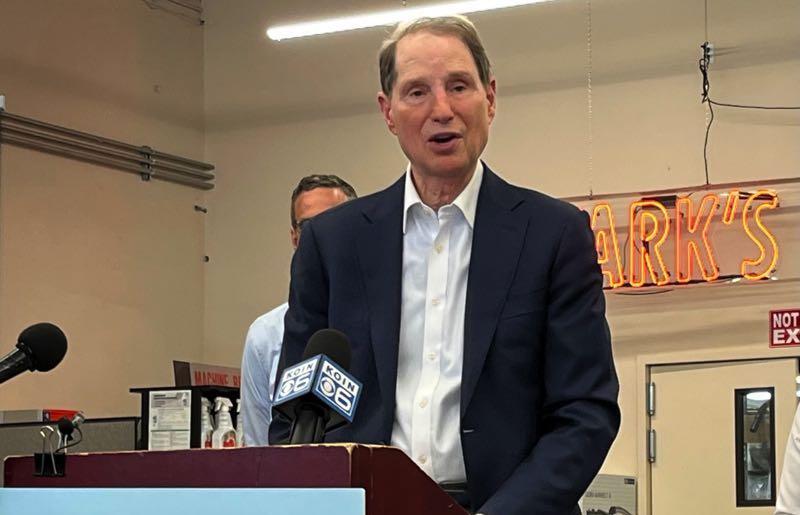
Congressional investigators acting as secret shoppers called 20 Oregon mental health providers listed in Medicare Advantage insurance plans and were unable to secure a single appointment.
In Washington, they called another 20 mental health providers and were able to schedule appointments with just two.
The U.S. Senate Finance Committee on Wednesday published these findings in a report highlighting the problem of “ghost networks,” health care directories full of inaccurate phone numbers and unavailable providers that keep patients from accessing care.
In all, the secret shoppers called 120 providers across six states and could secure only 18 appointments, an average of three in each state. With zero appointments booked, Oregon ranked dead last among states surveyed.
“It’s a breach of contract for insurance companies to sell their plan for thousands of dollars each month while their product is unusable — unusable due to a ghost network,” Oregon’s U.S. Sen. Ron Wyden said during a Senate Finance Committee hearing Wednesday. Of Oregon’s distinction, he said, “I’m not very proud.”
Wyden, a Democrat who chairs the committee, said he’d work with Republicans “to get some real accountability for these patients who paid good money for mental health coverage.”
Senate staff reviewed 12 different Medicare Advantage plans in six different states for the report. Staff called 10 providers listed in each provider’s plan seeking to secure an appointment for an older adult family member who needed help with depression and had recently moved to the area.
More than 80% of the 120 listings Senate staff contacted were either inaccurate or for an unavailable provider, according to the report. Some listed numbers connected staff to organizations completely unrelated to the listed provider.
One plan’s provider directory included numbers for a high school student health center, an inpatient psychiatric facility nursing station and a nonprofit organization that manages logistics for peer support groups. Another plan listed a number for a mental health specialist in another state. The receptionist at the office told Senate staff that the providers repeatedly notified the health plan that they are not in the plan’s contracted state and couldn’t provide services, according to the report.
The report found that Oregon had the most ghost listings of any of the six states surveyed. Staff were unable to secure any appointments from provider directories in Oregon and concluded they were 100% ghost listings. Washington and Massachusetts came in second with 90% ghost listings. Colorado fared best with half of providers deemed as ghost listings.
The Senate report isn’t the first indication that Oregon has problems with ghost networks. A study Oregon Health & Science University researchers published last year found that as many as nearly six in every 10 providers listed in Oregon Health Plan directories did not see patients in the Medicaid-funded plan.
Wyden said the “widespread existence of ghost networks is unacceptable” during what he called a “national crisis” on mental health. He said family members worried about the mental health of a loved one already have a hard time stepping up to coordinate their care.
“If they can’t get help, the last thing they need from a big insurance company is a symphony of please hold music when they call, and nonworking numbers and rejection,” Wyden said.
You can reach Jake Thomas at [email protected] or via Twitter @jakethomas2009.
Comments
Mr Rosenberg makes an…
Mr Rosenberg makes an excellent point. There is inherent conflict of interest in organizations with money managers input overriding the mission of the organization. I'm a nurse practitioner in Newberg. I started a clinic in 2017; we are over by the Safeway. The most effective pathway for my patients to find mental health is for me to go meet the mental health providers. We are in talks with one to join our team. Our foundation was developed by me during cancer treatment and a PhD in Austin, Texas (moved here to die, but it didn't work out); the way to make the system function when the goal is caring is to put professional "care-givers" as gatekeepers. I do that job. I was trained as a nurse ethicist. I'm the CEO. Then make the mission of the organization all about the Fourth Aim, the mental, emotional, physical, and spiritual health of the team. The team is the clinic and everyone who walks in the door, starting with staff; everyone benefits by the system in the form of money, profit sharing. Money managers can manage money stores. Caregivers should manage health care based upon the Ethics of Health care, the course I was so fortunate to teach at that tiny Texas University! (military child, not Texan by birth. ALL OREGONIAN by choice!
Medicare Advantage plans are a privatized version of Medicare. Insurance companies seek profit not access. They will do anything to avoid paying providers. They increase the cost of health care by hiring MBAs whose job is to maximize profit when they should be working to improve health and health care. We need to Abolish Private Health Insurance.